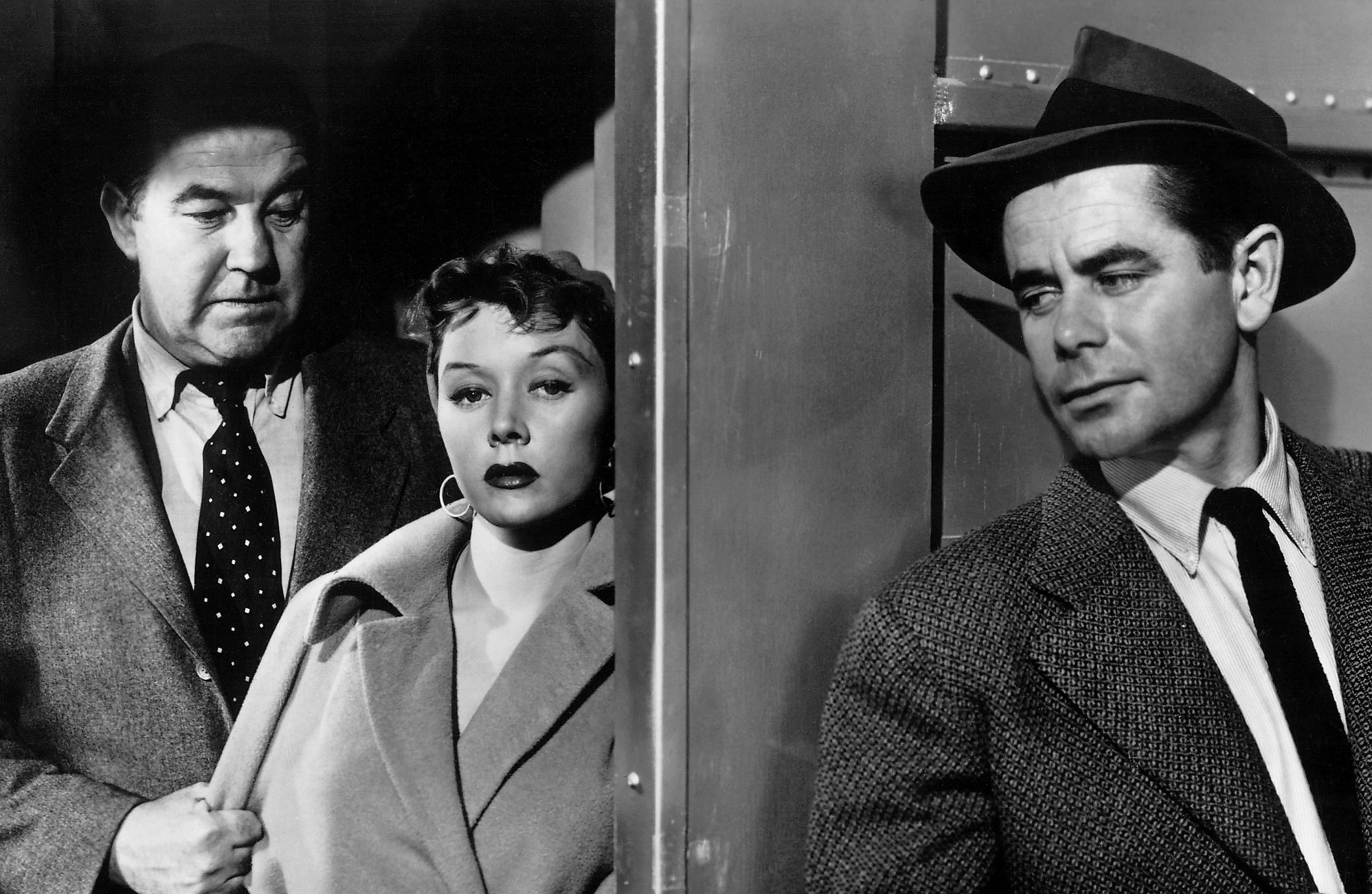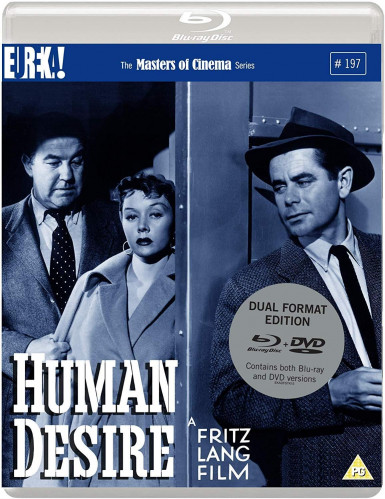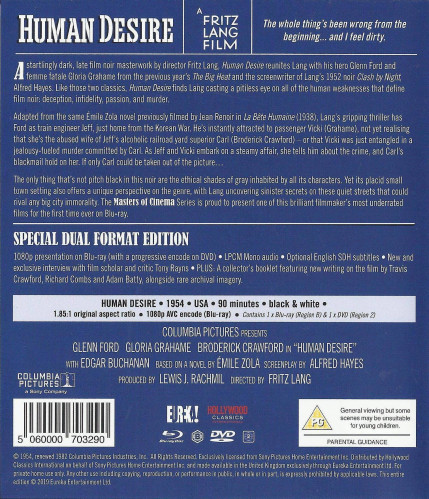HUMAN DESIRE [1954 / 2019] [EUREKA! Entertainment] [Blu-ray + DVD] [UK Release] A Rarity On The Screen . . . A Raw Slice Of Life!
A startlingly dark, late “film noir” masterwork by director Fritz Lang, ‘HUMAN DESIRE’ reunites Fritz Lang with his hero Glenn Ford and femme fatale Gloria Grahame from the previous year's ‘The Big Heat’ [1953] and reunites with screenwriter Alfred Hayes of the 1952 “film noir” ‘Clash by Night’ directed by Fritz Lang. Like those two classics, ‘HUMAN DESIRE’ finds Fritz Lang casting a pitiless eye on all of the human weaknesses that define “film noir” that is: deception, infidelity, passion, and murder.
Adapted from the same Émile Zola novel previously filmed by Jean Renoir in ‘La Bête humaine’ [1938], Fritz Lang's gripping thriller has Glenn Ford as train engineer Jeff Warren, just home from the Korean War. Jeff Warren is instantly attracted to passenger Vicki Buckley [Gloria Grahame], not yet realizing that she's the abused wife of Jeff Warren's alcoholic railroad yard superior Carl Buckley [Broderick Crawford] – or that Vicki Buckley was just entangled in a jealousy-fuelled murder committed by Carl Buckley. As Jeff Warren and Vicki Buckley embark on a steamy affair, she tells him about the crime and Carl Buckley's blackmail hold on her. If only Carl Buckley could be taken out of the picture...
The only thing that's not pitch black in this “film noir” are the ethical shades of grey inhabited by all its characters. Yet its placid small-town setting also offers a unique perspective on the genre, with Fritz Lang uncovering sinister secrets on these quiet streets that could rival any big city immorality. The Masters of Cinema is proud to present one of this brilliant filmmaker's most underrated films for the first time ever on Blu-ray.
FILM FACT: This film was largely shot in the vicinity of El Reno, Oklahoma. It used the facilities of what was at the time the Rock Island Railroad (now Union Pacific), though some of the moving background shots show East Coast scenes such as the Pulaski Skyway and the famous Lower Trenton Bridge ("Trenton Makes — The World Takes") over the Delaware River. The production utilizes other stock railroad footage. A major number of scenes take place around Chicago, Rock Island and Pacific Railroad ALCO FA unit No. 153 B-B diesel locomotives and painted as the fictitious Central National; however the interiors were filmed using a Hollywood mock-up of an EMD F-unit according to the Obscure Train Movies website.
Cast: Glenn Ford, Gloria Grahame, Broderick Crawford, Edgar Buchanan, Kathleen Case, Peggy Maley, Diane DeLaire, Grandon Rhodes, Benjie Bancroft (uncredited), Paul Brinegar (uncredited), Minta Durfee (uncredited), Jean Engstrom (uncredited), Victor Hugo Greene (uncredited), Don C. Harvey (uncredited), Carl Lee (uncredited), John Maxwell (uncredited), John Pickard (uncredited), Dan Riss (uncredited), Scott Seaton (uncredited), Allen D. Sewall (uncredited), Dan Seymour (uncredited), Olan Soule (uncredited), Hal Taggart (uncredited) and John Zaremba (uncredited)
Director: Fritz Lang
Producer: Lewis J. Rachmil
Screenplay: Alfred Hayes and Émile Zola (based on a novel)
Composer: Daniele Amfitheatrof
Gowns: Jean Louis
Make-up: Clay Campbell
Hair Styles: Helen Hunt
Cinematography: Burnett Guffey, A.S.C. (Director of Photography)
Image Resolution: Blu-ray: 1080p + DVD: 1080i (Black-and-White)
Aspect Ratio: 1.85:1
Audio: English: 2.0 LPCM Stereo Audio
Subtitles: English + English SDH
Running Time: 90 minutes
Region: Blu-ray: Region B/2 + DVD: PAL
Number of discs: 2
Studio: Columbia Pictures / EUREKA! Entertainment
Andrew’s Blu-ray Review: ‘HUMAN DESIRE’ [1954] is Fritz Lang’s version of Jean Renoir’s adaptation of Emile Zola’s novel “La Bête Humaine.” Fritz Lang has claimed that Jean Renoir’s film was far superior to his and that he only made ‘HUMAN DESIRE’ due to contractual obligations with Columbia Pictures, but please do not let this put you off.
Originally Rita Hayworth was to play the role of Vicki Buckley but when she couldn’t commit, Fritz Lang decided to reunite Glenn Ford and Gloria Grahame from the previous year’s ‘The Big Heat.’ The chemistry between the pair is again palpable. Lang was also reunited with Alfred Hayes, the screenwriter of his 1952 “film noir” hit ‘Clash by Night.’
Jeff Warren [Glenn Ford] has just returned from service in Korea. Jeff Warren is a genial guy, obviously popular with his co-workers in the railroad company where he works, driving trains with his pal Alec Simmons and is putting him up until he finds his own place and his family adore Jeff Warren. Especially daughter Ellen Simmons [Kathleen Case], who isn’t very secretive about her crush on Jeff Warren.
This rare “film noir” isn’t set in a big city, and the film ‘HUMAN DESIRE’ starts out naturalistically but soon many of the key ingredients of the genre such as infidelity, deception, and murder surface.
Vicki Buckley [Gloria Grahame] is in an unhappy marriage. Her husband Carl Buckley [Broderick Crawford] is a brutish older man who works in the same train yard as Jeff Warren. If he isn’t drinking in local bar Duggan’s, where Carl Buckley likes to spend his spare time whittling sticks of wood with a very sharp knife, but at the same time Jeff Warren can be insanely jealous. When he loses his job, he persuades Vicki Buckley to plead with John Owens [Grandon Rhodes], an important railroad customer she knows, to help him regain his position as a railroad stationmaster.
Spotting Jeff Warren on the train and not wanting to be seen, Carl Buckley insists that Vicki Buckley distract him, which she succeeds in doing in classic femme fatale style. Jeff Warren is immediately smitten and more trouble looms large when the pair embark on a relationship. Alarm bells really should ring when she asks if he killed anybody in Korea.
Despite some melodramatic moments, this is a gripping drama with a tautly written script. Burnett Guffey’s cinematography is impressive while Lang, despite his reservations, does a fine job too. Best of all is actress Gloria Grahame, who is beautiful, yet vulnerable – just as she was in real life – and Fritz Lang lets us make up our own minds on just how amoral Vicki Buckley is.
* * * * *
Blu-ray Image Quality – Columbia Pictures and EUREKA! Entertainment presents us the film ‘HUMAN DESIRE’ with a wonderful Black-and-White 1080p image and is of course enhanced with a 1.85:1 aspect ratio. The Blu-ray release was sourced from an older remaster that was prepared by Sony Pictures. Despite some obvious limitations, I like it quite a lot. One area where it is pretty easy to see that there is room for improvement is the density, and the reason for this is that the grain does not have that solid visual appearance that new 2K/4K remaster deliver. Also, there are traces of some light digital work that was likely done to rebalance the visuals as best as possible, but even on a larger screen the film retains an overall very pleasing organic appearance. I also like the grading. While a superior remaster will undoubtedly expand some nuances, I am not seeing any serious crushing issues on the current remaster. In fact, it appears that it was very carefully graded and as a result the night-time/dark footage from the railway yard looks very nice. Finally, the remaster is very healthy. There are no distracting cuts, scratches, debris, marks, or even tiny flecks. So all in all, this has been a very enjoyable visual experience. Please Note: Playback Region B/2: This will not play on most Blu-ray players sold in North America, Central America, South America, Japan, North Korea, South Korea, Taiwan, Hong Kong and Southeast Asia. Learn more about Blu-ray region specifications.
Blu-ray Audio Quality – Columbia Pictures and EUREKA! Entertainment brings us the film ‘HUMAN DESIRE’ with just one standard 2.0 LPCM Stereo Audio. The audio has been remastered and it is very easy to tell because the clarity and depth are as good as they can be for a period film of this nature. Balance is also very good. The most revealing sign that the audio was remastered are the very healthy high-frequencies. Indeed, on an older audio track there would have been various distortions, especially during the raw footage with the trains.
* * * * *
Blu-ray Special Features and Extras:
Special Feature: Interview with Tony Ryans [2019] [1080p] [1.78:1] [29:19] With this featurette, we get to view a brand new interview with Critic and Film Historian Tony Ryyns who discusses the production history of the film ‘HUMAN DESIRE,’ and informs us that the film was shot over a 35 day period in the winter of 1953/1954 and was released in September 1954 in the United States. Tony Ryans says when you see the credits before the film starts, it says screenplay is by Alfred Hayes and is based on the novel by Émile Zola the French novelist, but this is not actually true, but a distant truth, and is a sort of fake news and also the film is not closely based on the novel by Émile Zola, but much closer based on a film adaption by the French film director Jean Renoir who wrote over a 12 day period his novel entitled “La Bête Humaine” [‘The Human Beast and Judas Was a Woman’] and eventually it was released as a 1938 French film entitled ‘La Bête Humaine’ that was directed by Jean Renoir and was on the eve of the military occupation of Czechoslovakia by Nazi Germany began with the German annexation of the Sudetenland. Tony Ryan says that the reason that the film ‘HUMAN DESIRE’ got made in the period 1953/1954 was because Jerome Irving Wald was an American screenwriter and producer of films loved the 1938 French picture ‘La Bête Humaine’ directed by Jean Renoir, but Jerome Irving Wald knew the 1938 French picture ‘La Bête Humaine’ could not be made in America because the main character in the film the “human beast” of the title, has a hereditary madness and has several times in his life wanted to murder women. So to film ‘HUMAN DESIRE’ they had to tone down the character “human beast” quite considerable for the film, but to hint that he is a wife beater and murderer of women. Jerome Irving Wald thought the female character for the film should be the actress Rita Hayworth and of course played opposite the actor Glenn Ford in the amazing film ‘Gilda’ directed by Charles Vidor and on top of all that it was a massive box office success in 1946 and Jerome Irving Wald wanted to use the United States largest rail transport network for the majority of the film, but when the bosses got wind of the outline of the film and balked at the idea of using the United States largest rail transport network, so instead they tried to film in Canada and use the Canadian rail transport network, but because of a legal situation where in January 1953, Rita Hayworth was granted a divorce from Aly Khan on the grounds of extreme mental cruelty. So because Glenn Ford was now teamed up with the actress Gloria Grahame, they were able to proceed with the filming, because they negotiated with a business executive who owned the private North America’s freight railroads railway system, but because the negotiation took a long time for project to proceed in getting the green light, the filming started in the mid-winter period in 1953 and it was extremely cold and was quite an arduous shoot, but despite this situation, they were able to shoot the film over a 35 day period without any problems. The film ‘HUMAN DESIRE’ was very well received and a great surprise for director Fritz Lang is that the film was a massive success is France, but Fritz Lang thought he would be crucified in France because of taking on the challenge to remake the film ‘La Bête Humaine,’ but Francoise Truffaut hailed the film ‘HUMAN DESIRE’ as one of Fritz Lang’s greatest film. Tony Ryans talks about Alfred Hayes (18 April 1911 – 14 August 1985) the screenwriter and says he does not know much about his background and would like to know more, but what he does know about Alfred Hayes is that he was British-born and was born in Whitechapel in London to a Jewish family that emigrated to the United States of America when he was three years old. Tony Ryans also says he was a British-born screenwriter, television writer, novelist, and poet, who worked in Italy and the United States. Alfred Hayes wrote a well-known poem about “Joe Hill” ("I dreamed I saw Joe Hill last night") was set to music by Earl Robinson, and performed by Pete Seeger, Joan Baez and many other artists. Tony Ryans also mentions that Alfred Hayes graduated from New York's City College and now part of City University of New York, and worked briefly as a newspaper reporter, and began writing fiction and poetry in the 1930’s. During World War Two Alfred Hayes served in Europe in the U.S. Army Special Services that they called the “morale division,” and afterwards, Alfred Hayes stayed in Rome and became a screenwriter of Italian neorealist films. Alfred Hayes also rewrote one of the episodes of ‘All Thy Conquests’ and ‘The Girl on the Via Flaminia’ as part of his work as a co-writer for director Roberto Rossellini's ‘Paisà’ [1946] which earned him an Academy Award nomination. Alfred Hayes was an uncredited co-writer of Vittorio De Sica's neorealist film ‘Bicycle Thieves’ (Italian: ‘Ladri di biciclette’) [1948] for which he also wrote the English language subtitles. Alfred Hayes adapted “The Girl on the Via Flaminia” into a Broadway play in 1953, which is a semi-panoramic snapshot of the U.S. occupation of Italy, Rome specifically, in the latter stages of World War Two and that same year it was adapted into a French-language film ‘Un acte d'amour’ [1953]. Tony Ryans also mentions that Alfred Hayes that among his U.S. film writing credits are ‘The Lusty Men’ [1952], directed by Nicholas Ray and the film adaptation of the Maxwell Anderson/Kurt Weill musical ‘Lost in the Stars’ [1974]. Alfred Hayes other credits were as a television scriptwriter included scripts for American series “Alfred Hitchcock Presents,” “The Twilight Zone,” “Nero Wolfe” and “Mannix.” Tony Ryans also mentions that Alfred Hayes was also involved with these other films and they include ‘A Hatful of Rain’ [1957], ‘Island in the Sun’ [1957], ‘These Thousand Hills’ [1959] and ‘The Blue Bird’ [1976] which was an American-Soviet children's fantasy film directed by George Cukor. The screenplay by Hugh Whitemore, Alfred Hayes, and Aleksei Kapler and is based on the 1908 play “L'Oiseau bleu” by Maurice Maeterlinck. Tony Ryans sums up by saying that he is very enamoured by the very left wing Alfred Hayes and again wish he knew more about his background of this very enigma Alfred Hayes. Just at that point with this featurette with Tony Ryans comes to an end, and as a bonus we get to view lots of clips from the film ‘HUMAN DESIRE.’ The interview featurette was conducted exclusively for EUREKA! Entertainment.
Theatrical Trailer [1954] [480i] [1.78:1] [1:55] Withis this featurette, we get to view the Original Theatrical Trailer for the film ‘HUMAN DESIRE.’
* * * * *
DVD Special Features and Extras:
HUMAN DESIRE [1954] [1080i] [1.85:1] [90:44]
Special Feature: Interview with Critic and Film Historian Tony Rayns [2019] [1080i] [1.78:1] [29:16]
Theatrical Trailer [1954] [1080i] [1.78:1] [1:55] This is the Original Theatrical Trailer for the film ‘HUMAN DESIRE.’
PLUS: FIRST PRESSING ONLY: A beautiful collector’s 40 page booklet featuring new writings on the film ‘HUMAN DESIRE’ and they are THE CONFLICTS AND PERILS OF ‘HUMAN DESIRE’ by Travis Crawford. ‘HUMAN DESIRE’ by Richard Combs. BLOOD ON THE TACK by Adam Batty. VIEWING NOTES. PRODUCTION CREDITS. We get lots of wonderful black-and-white and colour publicity photos from the film ‘HUMAN DESIRE,’ and wonderful international colour cinema posters.
BONUS: Reversible printed Blu-ray cover featuring original Black-and-White scene from the film ‘HUMAN DESIRE.’
Finally, ‘HUMAN DESIRE’ brings together director Fritz Land and screenwriter Alfred Hayes does get right is the natural dialogue and the tight, efficient script. It’s a great example of economical storytelling done well. From the foreshadowing of Broderick Crawford whittling with his flick knife to the scene between Broderick Crawford and one of Gloria Grahame’s more promiscuous friends, which perfectly sets up the jealousy and insecurity that consumes him later on. The film also avoids a lot of the more obvious tropes of the genre and is refreshingly unpredictable as a result. Fritz Lang’s background in silent film and German Expressionism means the cinematography is also incredibly striking, with the train based setting recalling the angular set design of his early films. ‘HUMAN DESIRE’ had a much less abrupt conclusion and a more dynamic central character it could conceivably be considered a classic, but as it stands it’s one of Fritz Lang’s lesser works. To some people they might feel this is a very strange film overall; and at the same time slightly inconsistent, but at the same time very engaging, unpredictable and expertly directed, with both Broderick Crawford and Gloria Grahame turning in excellent performances. Highly Recommended!
Andrew C. Miller – Your Ultimate No.1 Film Aficionado
Le Cinema Paradiso
United Kingdom



